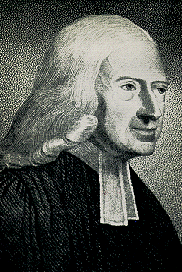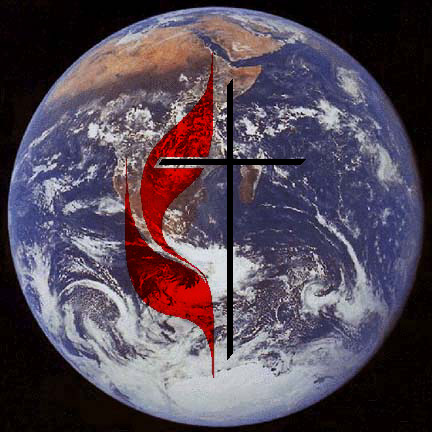|
|
|
|
How was the United
Methodist
Church formed? John Wesley, the father of Methodism, was born to Samuel
and Susanna Wesley in 1703 England. Samuel was a Church of England
clergyman and Susanna was exceedingly pious. John received an
education at Oxford University before being ordained as a priest of
the Church of England. John Wesley, the father of Methodism, was born to Samuel
and Susanna Wesley in 1703 England. Samuel was a Church of England
clergyman and Susanna was exceedingly pious. John received an
education at Oxford University before being ordained as a priest of
the Church of England.Wesley and his brother Charles formed a "Holy Club" while at Oxford University. Members met frequently for Bible study, prayer, and self-examination, and shared in the Lord's Supper each week at the very least. They carried out good deeds by visiting prisoners and teaching poor children, formed the first boarding school for orphan boys and poor children in London. Although they were ridiculed, event physically abused, their faith was built on Jesus' command: "Feed My Sheep." The brothers traveled to America, with Wesley serving as a pastor to the colonists and missionary to the Native Americans and Charles serving as General Oglethorpe's secretary. John admitted that the main reason for his travels was "the hope of saving my own soul." Feeling that his faith was flawed, Wesley soon returned to England. At a small meeting on Aldersgate Street, he felt his heart "strangely warmed" and believed that he trusted "Christ alone for my salvation; and an assurance was given me that He had taken away my sins, even mine, and saved me from the law of sin and death." Shortly thereafter he began to preach these truths, the basics of our faith as Methodists. He formed discussion groups of the converted (some of whom were women) who returned to their communities to preach. Wesley continued preaching that people should shape their lives by "avoiding evil of every kind, such as profanity, profaning the day of the Lord, drunkenness, buying or selling slaves, fighting, and smuggling." He also urged his followers to do good as well, "giving food to the hungry, clothing the naked, visiting the sick and prisoners, and by instructing, reproving, or exhorting sinners." They were also to attend church, search the Scriptures, fast, and engage their family in prayer. Because of the strictness of their convictions and the method which they had for everything, they soon became known as "Methodists." In late October of 1769, two missionaries, Richard Boardman and Joseph Pilmore, were appointed by Wesley to begin the task of organizing Methodism in America, not as something separate from the Church of England, but as a society of people who "earnestly desire to flee from the wrath to come" and who desired to "walk according to the Oracles of God." Pilmore said, "This is our one point, that Christ died for us, to live in us, and reign over us in all things." In 1771, Francis Asbury, arrived in America to preach Methodism. Wesley had always admonished his followers to receive the holy sacraments of baptism and communion within the Church of England. But, with the advent of the Declaration of Independence, most of the priests returned to England. Asbury was the only one who remained, and had to remain in hiding because he would not take the oath of loyalty that would have committed him to support the use of violence. With no strong leadership, American Methodism was in a state of crisis as the war ended in 1783. However, over 15,000 Methodists were being served by 83 traveling preachers. Pillmore wrote to Wesley, "The chief difficulty we labor under is want of Ordination and I believe we shall be obliged to procure it by some means or other." Wesley believed that as a priest of the Church of Christ, he had the right to ordain under special missionary circumstances. He therefore ordained two lay preachers - Richard Whatcoat and Thomas Vassey - for ministry in America on September 1, 1784 and proclaimed that Thomas Coke along with Asbury should be joint superintendents. He sent with Coke and Whatcoat their ordination letters, a hymn book, and a prayer book with his modifications of the Church of England's doctrinal guidelines.
What are the Predecessor
Denominations of the United
Methodist Church? Annual Conference - an organizational unit within United Methodism (and all predecessor denominations), consisting of churches in a given geographical area. Clergy and lay delegates attend a business session each year, usually in the early summer, at which time clergy receive their preaching appointments for the coming year. Financial business, reports of the numbers of new members, and other matters are also addressed at this yearly meeting. Annual Conference Journal - Published every year, the journal contains detailed information about, clergy, churches, and ministries of an annual conference. Appointment - The preacher's assignment by the bishop of the annual conference where the preacher holds his or her membership. Charge - The church or churches to which a pastor is appointed. |
 Asbury would not accept this unless elected to it by his fellow
preachers. All preachers were called together (they had been
assembling annually in conference since 1773) at Lovely Lane Chapel
Christmas Eve in Baltimore. By establishing the Methodist Episcopal
Church, they acted as the thirteen colonies had done eight years
earlier; they freed themselves of Wesley and the church's ties to
England. They, however, pledged to continue following the council of
Wesley. The group established a new church; elected Francis Asbury
as a supervisor; prepared a Book of Disciple for the new church
which provided that all Methodist slave-owners free their slaves
immediately; ordained a number of persons; and established a
college.
Asbury would not accept this unless elected to it by his fellow
preachers. All preachers were called together (they had been
assembling annually in conference since 1773) at Lovely Lane Chapel
Christmas Eve in Baltimore. By establishing the Methodist Episcopal
Church, they acted as the thirteen colonies had done eight years
earlier; they freed themselves of Wesley and the church's ties to
England. They, however, pledged to continue following the council of
Wesley. The group established a new church; elected Francis Asbury
as a supervisor; prepared a Book of Disciple for the new church
which provided that all Methodist slave-owners free their slaves
immediately; ordained a number of persons; and established a
college.